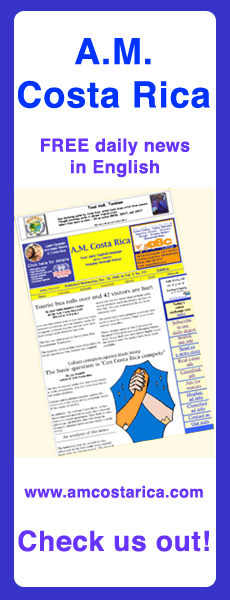Costa Rica Expertise LLC
Post details: A Checklist to Stay Out of Real Estate Trouble
09/05/05
A Checklist to Stay Out of Real Estate Trouble

By Garland M. Baker
Special to A.M. Costa Rica
Every day more and more foreigners are investing in all types of real estate in Costa Rica. All types are the caveat words. There are so many kinds of property in the country, investors need to be very careful when buying anything. There are titled and untitled land, beach and concession property, forest reserve and protected land to name a few varieties.
To buy real estate here it is a good idea to have a checklist. Here is a simple one to use:
The first item on the list is to know if a property has a title, who owns the title and what type of property it is. The Registro Nacional keeps the records on titled property.
Real property has a finca number. Finca means farm in English but does not mean a country farm with chickens. The term means a section of real property. Even houses on lots in the city are parts of fincas. Finca numbers or farm numbers have two basic parts. The first digit defines the district in which the property is located. The last six digits is a unique identification number. For example a finca number (or lot number) in San José would look something like this: 1-000000. The one is for San José, and the zeros would be a real number identifying the property.
Property District Numbers:
1 - San José
2 - Alajuela
3 - Cartago
4 - Heredia
5 - Guanacaste
6 - Puntarenas
7 - LimónProperty Types
F - Filial
M - Mother
Z - Concession
Farms can also be further broken down into undivided interests. In these cases, an additional three-digit number is added to indicate the number of owners.
There are four basic types of property listed at the national registry. The first is the traditional titled property. Condominium property is land divided from fincas matriz or mother properties into fincas filial or filials and concessions. Concession land is leased territory controlled by municipalities and the Instituto Costarricense de Turismo.
Properties not listed at the national registry include untitled homesteaded land, beach land within the maritime zone, forest reserve, condominiums that do not qualify for true title and others.
Most Costa Rican land is titled, and it is the safest investment. However, other properties hold opportunities too. It is crucial to obtain expert advice when considering any of these properties, including condominiums that do not provide true title.
One example: Developers are selling forested land on maritime zones along the Pacific. However, getting permission from the Ministerio de Ambiente y Energía to cut down any trees on these properties is nearly impossible. So buyers either cannot build or must engage in illegal cutting of trees.
Second on the list, is a company to hold your investment. Own nothing in Costa Rica personally. It is just too dangerous. It is too easy to lose to professional crooks or have ownership strangled by a lengthy probate process.
The best company structures to use for holding property are sociedades anónimas known as S.A.’s or sociedades de responsabilidad limitada or limited liability corporations. Both offer the convenience that shareholders are responsible for the assets and not individuals. LLC’s are the best for property because stock cannot be transferred by endorsing the certificate to someone else without a shareholders' meeting and minutes in the legal books.
Third on the list is to shop for fees. Transferring property can be very expensive. Attorneys can charge as much as 1.25 percent of the true market value of the sale. However, others will negotiate. Transfer taxes are .26 percent of the sale price.
Most sales in Costa Rica are not registered at the national registry at the true sales price, but lawyers charge their fees based on the full price. This is an amazing contradiction: some lawyers do not care about pulling a fast one on the government but do not want to lose one colon of their fees. Sale values sometimes are declared at a laughable several hundred thousand colons.
Here is the last item on this short list. Verify that any property purchased is ultimately registered. Lawyers play with the transfer taxes and sometimes just do not fulfill their obligation to their clients and never register the sale.
There are many other points to consider when buying property in Costa Rica. This list is to illustrate you should have a list. Many people do not and just show up at the property-closing table as trusting souls. Many later find surprises that turn a dream investment into a horror story.
Garland M. Baker has been a resident of Costa Rica since 1972 and is now a naturalized citizen. He provides multidisciplinary professional services to the international community. Lic. Allan Garro provides the legal review. Reach them at [email protected] Baker has undertaken the research leading to these series of articles in conjunction with A.M. Costa Rica. Copyright 2005, use without permission prohibited.
Obtain a Complimentary Reprint of this article by clicking here: FREE REPRINT
Costa Rica Expertise LLC
This web site contains articles written by Garland M. Baker and Lic. Allan Garro for the A.M. Costa Rica. These articles contain important information that everyone doing business—personal and corporate—in Costa Rica ought to know. Reach them at [email protected]
A Complimentary Reprint is available at the end of each article.
Search
Categories
| Mon | Tue | Wed | Thu | Fri | Sat | Sun |
|---|---|---|---|---|---|---|
| << < | > >> | |||||
| 1 | 2 | 3 | 4 | 5 | 6 | |
| 7 | 8 | 9 | 10 | 11 | 12 | 13 |
| 14 | 15 | 16 | 17 | 18 | 19 | 20 |
| 21 | 22 | 23 | 24 | 25 | 26 | 27 |
| 28 | 29 | 30 | 31 | |||
Links
Government Web Sites- Caja Costarricense de Seguro Social
- Direccion General Migracion Costa Rica
- Gobierno de Costa Rica
- ICE
- Instituto Costarricense de Turismo
- Instituto Nacional de Seguros
- La Gaceta - Diario Oficial
- La Procuraduría General de la República
- Ministerio de Justicia
- Ministerio de Trabajo y Seguridad Social
- Poder Judicial
- Radiografica Costarricense S.A.
- Registro Nacional
- Registro Nacional Sistema de Consultas
- Colegio de Abogados
- Colegio de Arquitectos
- Colegio de Contadores Privados
- Colegio de Contadores Publicos
- A.M. Costa Rica
- All CR Expertise Articles
- Babelfish Web Site Translator
- Carfax.com
- Currently Suspended Lawyers
- Google Earth - formerly Keyhole - 3D satellite imaging
- U.S. Department of State
- U.S. Visa Denials Page
- U.S. Visa Home Page
- United States Embassy in Costa Rica
- US Embassy Death Assistance Page
Syndicate this site 
What is RSS?

powered by
![]()



